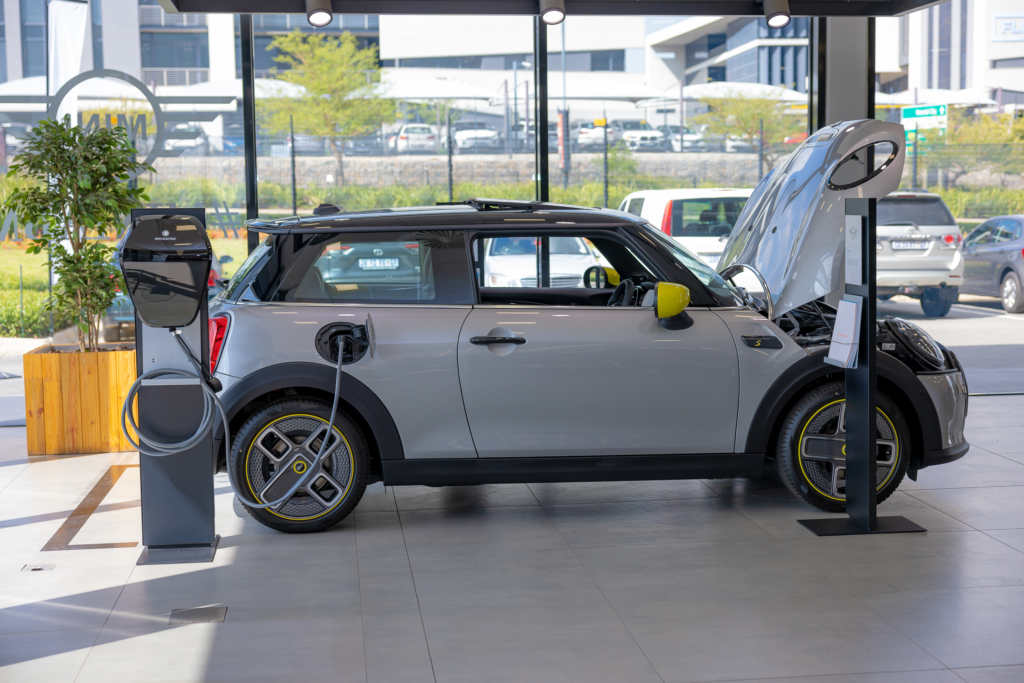
South Africa marked a step forward in inevitable energy transition. Insightful research commissioned by IYF and funded by the British High Commission was handed over to the Department of Higher Education in a ceremony hosted by BMW South Africa. The research assessed South Africa’s current and potential readiness for the Electric Vehicle (EV) transition and the findings of the study will influence future upskilling, upscaling and capacitating in the EV training sector.
Facilitated by Chilu Lemba, the event provided insight from various collaborative entities about the future of EVs in South Africa, and particularly the significance of TVETs in curating new curricula for the inevitable influx of electric vehicles into South Africa.
Speaking to the research, Head Curriculum portfolio for TVET colleges, DHET, Mr Vele posited that “If we are to have qualified EV engineers in the country in the next 5 years, or even the next ten years, we have a limited window of opportunity to ensure that EV courses and practical training is available.”
The IYF, which has been updating existing TVET curricula for the past year through their engineering offshoot, High Gear, mentioned how the research was imperative in understanding the skills gap amongst lecturers in TVETs. The IYF’s Country Director, Arusha Naicker, mentioned that while High Gear’s programmes had been successful in increasing student readiness for industry through practical and digital learning, lecturers were not fully capacitated to facilitate or lead curricula on EV technical procedures and maintenance. The “outdated” curricula is also attributed to the lack of EVs in South Africa currently – however the number of purchased electric vehicles is on the rise and this will inevitably lead to the need for efficiently trained and skilled technicians in the sector.
The research, which was conducted by Ngawethu Consulting, will essentially influence how IYF and DHET plan to move forward with pragmatically and functionally resourcing and capacitating TVET lecturers with the knowledge, curricula and requirements necessary to prepare automotive engineering students for the new world of EVs.
Speakers, which also included Khalil Patel, the Programme Director for High Gear, highlighted the importance of championing critical thinking in TVET courses, and how future EV courses need to have a foundational umbrella understanding of the EV market and Green Supply Chain – and not only be rooted in a practical understanding of EV mechanics.
Singh was incredibly positive about the outcomes of the research, as while they highlighted many hurdles and skills gaps which will need to be addressed in order to move forward in the energy transition, it provided DHET with a useful guideline as to where to place their focus in preparing South Africa for the transition, both timeously and thoughtfully.
Rebecca Tron, Head of Economic Growth, Southern Africa, for the British High Commission Pretoria, commended the IYF’s efforts and DHET’s positive response to the research, noting that South Africa’s commitment to a greener economy was not only beneficial globally, but would also contribute to the country’s intercontinental automotive trading potential, knowledge economy and expanded human capital.
Kyle Dreyer, Sales Manager, BMW, the event host, instilled some interactivity into the event by providing attendees with the opportunity to test drive their hybrid and electric vehicles, offering guests a glimpse into the future of the EV industry.
Ultimately, the research will inform the country’s next steps in a vital component of the global energy transition and influence the success of the Low Emission Development Strategy, which intends to reduce South Africa’s carbon emissions to net zero by 2050.
